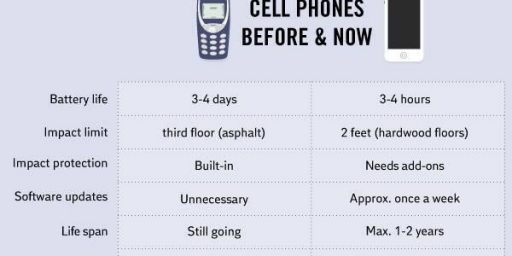Cell Phones And Lower Crime Rates
An interesting new study suggests that the ubiquitousness of mobile phones has been an important factor in reducing crime rates:
Researchers pondering the reason for a one-third drop in the crime rate during the 1990s have suggested a number of reasons why. Perhaps the drop was because of more police on the street, they argued, or more criminals in prison, or changes in the market for crack cocaine. Or maybe there are fewer criminals because of school desegregation, lower lead exposure in children, or a lower incidence of fetal alcohol syndrome.
A new paper offers another explanation for lower crime rates, particularly in the areas of rape and assault: the proliferation of cellphones. The co-authors are University of Pennsylvania law professor Jonathan Klick, George Mason University law and economics professor Thomas Stratmann, and University of Pennsylvania criminology department chairman John MacDonald. A press release has details.
“Given that mobile phones increase surveillance and the risks of apprehension when committing crimes against strangers,” the professors write, “an expansion of this technology would increase the costs of crime as perceived by forward-looking criminals.” The devices allow for quicker reporting of crimes and, in some cases, instant communication of details, they point out.
It’s an interesting hypothesis. Certainly, most forms of street crime — whether we’re talking pickpocketing/purse snatching or other more serious offenses like assault and rape — are quite often crimes of opportunity, meaning that a criminal acts when he thinks the odds that he will get caught are relatively low. With more people carrying cell phones the odds that a potential victim or witness may be able to contact the police a a moment’s notice are much higher, thus making the criminal act riskier. Of course, correlation does not equal causation and there are a number of other reasons that the crime rate has dropped steadily over the past couple decades, but this study raises and interesting possibility that our technology may be impacting our world in ways we don’t even realize.






I think cell phones are a big part of it. I think the move away from cash may be another.
It might discourage a rapist or a mugger if he thought the victim could photograph him and transmit the photo to the police department while calling in the crime. “Hello, 911? I’m being assaulted, and by the way, here’s a pic of the guy doing it.”
The theory would make more sense if there were not an increased of cell phones being stolen in public places like subways. Of course, another theory is that since everyone has a cell phone, law enforcement can figure out who was in the area when an assault or rape occurs. The idiot criminals also text and photograph their own crimes and create enough evidence to convict them.
Tougher criminal laws, mandatory minimum sentences, California’s “Three Strikes” law and its progeny, more aggressive law enforcement, higher prison populations. Welfare reform. Plus a really good economy for almost that entire decade. And much lower crime rates. Seems pretty obvious how to connect those dots.
Speaking of which, what’s tragically ironic about all these academic studies that get released about crime and punishment and related items — most of which often jump through their own arseholes to avoid the obvious points — is that even academics understand that poverty and crime directly are related. The more poverty the more crime. The less poverty the less crime. Along with fewer other societal ills.
Yet we could all live to be 1000 and yet never see from the liberal academe any suggestion that maybe, just maybe, possibly, we could try to reduce poverty in this country, and thereby reduce crime, blight, etc., by disengaging from the intractable quagmire of the “war on poverty.”
Any drop in crime is without a doubt caused by policies that comport with my ideology and are completely unrelated to policies that run contrary to my ideology.